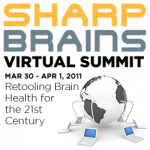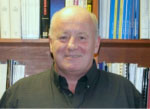Six New Speakers @ 2011 SharpBrains Summit
 We are proud to confirm six additional excellent Speakers at the upcoming 2011 SharpBrains Summit (remember, this is a fully virtual event so it requires no travel). Three Speakers are based in the US, two in the UK, one in Australia, and they truly represent a range of perspectives and expertise to discuss, as the Summit tagline promises, Retooling Brain Health for the 21st Century.
We are proud to confirm six additional excellent Speakers at the upcoming 2011 SharpBrains Summit (remember, this is a fully virtual event so it requires no travel). Three Speakers are based in the US, two in the UK, one in Australia, and they truly represent a range of perspectives and expertise to discuss, as the Summit tagline promises, Retooling Brain Health for the 21st Century.
 Professor Cary L. Cooper chaired the Science Co-ordination team of the Foresight Project on Mental Capital and Wellbeing. He is a Professor of Organizational Psychology and Health at the Lancaster University Management School, President of the British Association for Counselling and Psychotherapy, and Director and founder of Robertson Cooper Ltd. Prof. Cooper is recognised as a world-leading expert on stress and workplace issues, and received his BS and MBA degrees from the University of California, Los Angeles, and his PhD from the University of Leeds.
Professor Cary L. Cooper chaired the Science Co-ordination team of the Foresight Project on Mental Capital and Wellbeing. He is a Professor of Organizational Psychology and Health at the Lancaster University Management School, President of the British Association for Counselling and Psychotherapy, and Director and founder of Robertson Cooper Ltd. Prof. Cooper is recognised as a world-leading expert on stress and workplace issues, and received his BS and MBA degrees from the University of California, Los Angeles, and his PhD from the University of Leeds.
 Dr. Keith Wesnes is a Practice Leader at United BioSource Corporation. In 1986 Professor Wesnes founded Cognitive Drug Research (acquired in 2009 by United BioSource) to offer this system as a service in clinical trials. Professor Wesnes has published over 270 peer-reviewed research articles as well as more than 20 chapters and literature reviews. He holds Professorships at the Human Cognitive Neuroscience Unit at Northumbria University, Newcastle, UK and the Brain Sciences Institute at Swinburne University, Melbourne, Australia.
Dr. Keith Wesnes is a Practice Leader at United BioSource Corporation. In 1986 Professor Wesnes founded Cognitive Drug Research (acquired in 2009 by United BioSource) to offer this system as a service in clinical trials. Professor Wesnes has published over 270 peer-reviewed research articles as well as more than 20 chapters and literature reviews. He holds Professorships at the Human Cognitive Neuroscience Unit at Northumbria University, Newcastle, UK and the Brain Sciences Institute at Swinburne University, Melbourne, Australia.
 Steven Aldrich is President and CEO of Posit Science, joining the company from Intuit where he created significant growth over 13 years in many roles. Steven was President of Quicken Insurance, a business he co-founded and sold to Intuit. He has worked in the investment banking division of Alex. Brown & Sons and for McKinsey & Company, completed his MBA at the Stanford Graduate School of Business, and he holds an AB in Physics from the University of North Carolina. Steven is an avid supporter of the arts, and President of the Board of the Bay Area Glass Institute.
Steven Aldrich is President and CEO of Posit Science, joining the company from Intuit where he created significant growth over 13 years in many roles. Steven was President of Quicken Insurance, a business he co-founded and sold to Intuit. He has worked in the investment banking division of Alex. Brown & Sons and for McKinsey & Company, completed his MBA at the Stanford Graduate School of Business, and he holds an AB in Physics from the University of North Carolina. Steven is an avid supporter of the arts, and President of the Board of the Bay Area Glass Institute.
 Dr. Martha Farah is the Director of the Center for Neuroscience and Society at the University of Pennsylvania, and Annenberg Professor of Natural Sciences. Much of her career has been devoted to understanding the mechanisms of vision, memory, and executive function in the human brain. Her current interests lie at the interface between cognitive neuroscience and “the real world,” including the effects of socioeconomic adversity on children’s brain development and emerging social and ethical issues in neuroscience (“neuroethics”), mood regulation, and decision making.
Dr. Martha Farah is the Director of the Center for Neuroscience and Society at the University of Pennsylvania, and Annenberg Professor of Natural Sciences. Much of her career has been devoted to understanding the mechanisms of vision, memory, and executive function in the human brain. Her current interests lie at the interface between cognitive neuroscience and “the real world,” including the effects of socioeconomic adversity on children’s brain development and emerging social and ethical issues in neuroscience (“neuroethics”), mood regulation, and decision making.
 Dr Michael Valenzuela is a Research Fellow at the School of Psychiatry, University of New South Wales, and Leader of the Regenerative Neuroscience Group at UNSW. His current research is aimed at understanding the competing forces of neuroplasticity and degeneration in the human brain, and includes studies of adult stem cells, animal models, neuroimaging, clinical trials and epidemiology. In 2006, he was awarded the prestigious Eureka Prize for Medical Research for his research on the relationship between dementia and complex mental activity.
Dr Michael Valenzuela is a Research Fellow at the School of Psychiatry, University of New South Wales, and Leader of the Regenerative Neuroscience Group at UNSW. His current research is aimed at understanding the competing forces of neuroplasticity and degeneration in the human brain, and includes studies of adult stem cells, animal models, neuroimaging, clinical trials and epidemiology. In 2006, he was awarded the prestigious Eureka Prize for Medical Research for his research on the relationship between dementia and complex mental activity.
 Dharma Singh Khalsa, M.D. has been the President and Medical Director of the Alzheimer’s Research and Prevention Foundation since 1993. He is a graduate of Creighton University School of Medicine in Omaha, Nebraska. Dr. Khalsa received his training in Anesthesiology at the University of California, San Francisco, where he was Chief Resident. He is also a graduate of the University of California, Los Angeles Medical Acupuncture for Physicians Program and has studied mind/body medicine at Harvard Medical School’s Mind/Body Medical Institute.
Dharma Singh Khalsa, M.D. has been the President and Medical Director of the Alzheimer’s Research and Prevention Foundation since 1993. He is a graduate of Creighton University School of Medicine in Omaha, Nebraska. Dr. Khalsa received his training in Anesthesiology at the University of California, San Francisco, where he was Chief Resident. He is also a graduate of the University of California, Los Angeles Medical Acupuncture for Physicians Program and has studied mind/body medicine at Harvard Medical School’s Mind/Body Medical Institute.
Learn more and Register to participate in the 2011 SharpBrains Summit by clicking Here. Early-bird rates end on February 18th!


